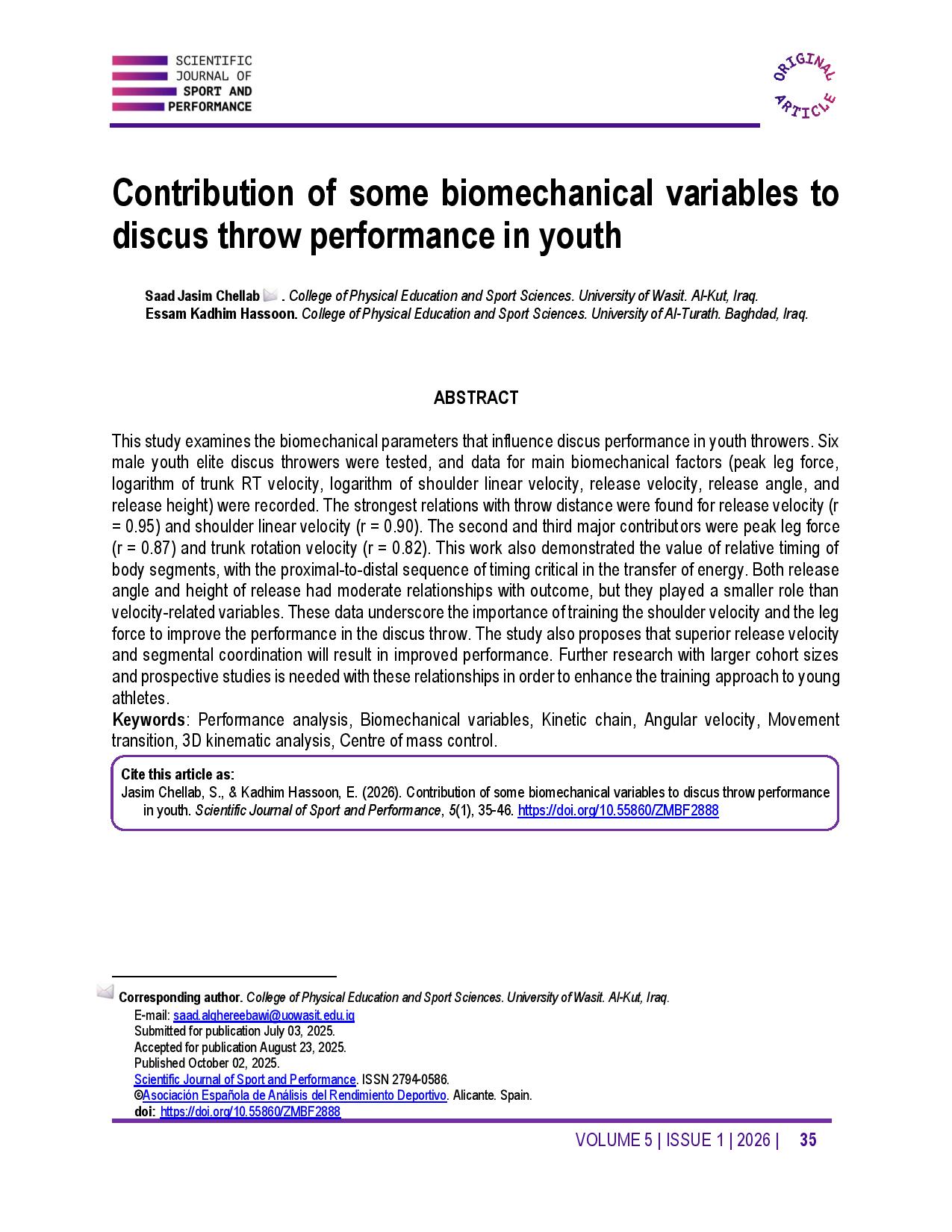Contribution of some biomechanical variables to discus throw performance in youth
Main Article Content
Abstract
This study examines the biomechanical parameters that influence discus performance in youth throwers. Six male youth elite discus throwers were tested, and data for main biomechanical factors (peak leg force, logarithm of trunk RT velocity, logarithm of shoulder linear velocity, release velocity, release angle, and release height) were recorded. The strongest relations with throw distance were found for release velocity (r = 0.95) and shoulder linear velocity (r = 0.90). The second and third major contributors were peak leg force (r = 0.87) and trunk rotation velocity (r = 0.82). This work also demonstrated the value of relative timing of body segments, with the proximal-to-distal sequence of timing critical in the transfer of energy. Both release angle and height of release had moderate relationships with outcome, but they played a smaller role than velocity-related variables. These data underscore the importance of training the shoulder velocity and the leg force to improve the performance in the discus throw. The study also proposes that superior release velocity and segmental coordination will result in improved performance. Further research with larger cohort sizes and prospective studies is needed with these relationships in order to enhance the training approach to young athletes.
Article Details

This work is licensed under a Creative Commons Attribution-NonCommercial-ShareAlike 4.0 International License.
References
Abdulkareem, O. W., Jabbar, H. S., & Obaid, A. J. (2025). The Effect of Soft Toss Machine Training on Some Kinematic Variables and backhand accuracy of Tennis Players U16 years. Journal of Physical Education (20736452), 37(1), 190-205. https://doi.org/10.37359/JOPE.V37(1)2025.2147 DOI: https://doi.org/10.37359/JOPE.V37(1)2025.2147
Alimjanovna, Y. K. (2024). Biomechanical analysis of discus throwing in female athletes: A comprehensive review. Research Focus, 3(10), 98-102.
Aoki, K., Kohmura, Y., Sakuma, K., Koshikawa, K., & Naito, H. (2015). Relationships between field tests of power and athletic performance in track and field athletes specializing in power events. International Journal of Sports Science & Coaching, 10(1), 133-144. https://doi.org/10.1260/1747-9541.10.1.133 DOI: https://doi.org/10.1260/1747-9541.10.1.133
Bartlett, R. M. (1992). The biomechanics of the discus throw: A review. Journal of Sports Sciences, 10(5), 467-510. https://doi.org/10.1080/02640419208729944 DOI: https://doi.org/10.1080/02640419208729944
Dai, B., Leigh, S., Li, H., Mercer, V. S., & Yu, B. (2013). The relationships between technique variability and performance in discus throwing. Journal of Sports Sciences, 31(2), 219-228. https://doi.org/10.1080/02640414.2012.729078 DOI: https://doi.org/10.1080/02640414.2012.729078
Gambetta, V. (1981). Track and field coaching manual: coaching techniques and guidelines formulated by the Athletics Congress' Olympic Development Committee. Leisure Press.
Hamid, J. A. K., Salama, O. A.-I., Sadiq, A. J., Jasim, T. A., & Ismaeel, S. A. (2025). Three-Dimensional Quantitative Analysis of Kinematic Variables in Discus Throwing Performance. Journal of Sport Biomechanics, 10(4), 310-322. https://doi.org/10.61186/JSportBiomech.10.4.310 DOI: https://doi.org/10.61186/JSportBiomech.10.4.310
Hay, J. G., & Yu, B. (1995). Critical characteristics of technique in throwing the discus. Journal of Sports Sciences, 13(2), 125-140. https://doi.org/10.1080/02640419508732220 DOI: https://doi.org/10.1080/02640419508732220
Herman, I. P. (2016). Physics of the human body. Springer. https://doi.org/10.1007/978-3-319-23932-3 DOI: https://doi.org/10.1007/978-3-319-23932-3
Knudson, D. (2007). Fundamentals of Biomechanics. Springer US. https://doi.org/10.1007/978-0-387-49312-1 DOI: https://doi.org/10.1007/978-0-387-49312-1
Leigh, S., Gross, M. T., Li, L., & Yu, B. (2008). The relationship between discus throwing performance and combinations of selected technical parameters. Sports Biomechanics, 7(2), 173-193. https://doi.org/10.1080/14763140701841399 DOI: https://doi.org/10.1080/14763140701841399
Leigh, S., Liu, H., Hubbard, M., & Yu, B. (2010). Individualized optimal release angles in discus throwing. Journal of Biomechanics, 43(3), 540-545. https://doi.org/10.1016/j.jbiomech.2009.09.037 DOI: https://doi.org/10.1016/j.jbiomech.2009.09.037
Panoutsakopoulos, V., & Kollias, I. A. (2012). Temporal analysis of elite men's discus throwing technique. https://doi.org/10.4100/jhse.2012.74.10 DOI: https://doi.org/10.4100/jhse.2012.74.10
Schaa, W. (2010). Biomechanical analysis of the shot put at the 2009 IAAF World Championships in athletics. New Studies in Athletics, 25(3/4), 9-21.
Schlüter, W., & Nixdorf, E. (1984). Kinematische beschreibung und analyse der Diskuswurftechnik. Leistungssport, 6, 17-22.
Stodden, D. F., Fleisig, G. S., McLean, S. P., & Andrews, J. R. (2005). Relationship of biomechanical factors to baseball pitching velocity: within pitcher variation. Journal of Applied Biomechanics, 21(1), 44-56. https://doi.org/10.1123/jab.21.1.44 DOI: https://doi.org/10.1123/jab.21.1.44
Terzis, G., Spengos, K., Kavouras, S., Manta, P., & Georgiadis, G. (2010). Muscle fibre type composition and body composition in hammer throwers. Journal of Sports Science & Medicine, 9(1), 104.
Trasolini, N. A., Nicholson, K. F., Mylott, J., Bullock, G. S., Hulburt, T. C., & Waterman, B. R. (2022). Biomechanical analysis of the throwing athlete and its impact on return to sport. Arthroscopy, Sports Medicine, and Rehabilitation, 4(1), e83-e91. https://doi.org/10.1016/j.asmr.2021.09.027 DOI: https://doi.org/10.1016/j.asmr.2021.09.027
Winter, D. A. (2009). Biomechanics and motor control of human movement. John Wiley & sons. https://doi.org/10.1002/9780470549148 DOI: https://doi.org/10.1002/9780470549148
Yu, B., Broker, J., & Silvester, L. J. (2002). Athletics: A kinetic analysis of discus‐throwing techniques. Sports Biomechanics, 1(1), 25-45. https://doi.org/10.1080/14763140208522785 DOI: https://doi.org/10.1080/14763140208522785
Zaher Yahya, S., Kazem Abdul Rida, B., & Waleed Abdulkareem, O. (2024). effect of a laser device on some biomechanical variables of the rotational phase in the achievement of 100 m freestyle swimming for the Iraqi team (16-18 years old). Scientific Journal of Sport and Performance, 3(4), 507-512. https://doi.org/10.55860/ZHOW5603 DOI: https://doi.org/10.55860/ZHOW5603




